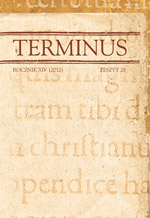Samuel Brzeżewski o ludziach i drzewach, czyli emblematyka w kazaniu Oliwa wdzięcznoozdobnej zieloności
Samuel Brzeżewski on people and trees. Emblematics of the sermon Oliwa wdzięcznoozdobnej zieloności
Author(s): Dariusz DybekSubject(s): Language and Literature Studies
Published by: Wydawnictwo Uniwersytetu Jagiellońskiego
Summary/Abstract: Samuel Brzeżewki was a Baroque, nowadays forgotten, preacher. There are three sermons hold as his testimony. First two sermons refer to Marian theme; the last one (dated on 1645) is a funeral homily. Oliwa wdzięcznoozdobnej zieloności przysadzonej […] na kazaniu przy pogrzebie […] Gerzego Pucniewskiego is dedicated to a nobleman, Pucniewski. He came from Minor Poland, Abdank Coat of Arms and remained practically an unknown figure. In order to present Pucniewski as a Christian role model, Brzeżewski used a very popular device, symbolism. He intended to create an unconventional as well as memorable picture for his audience. The author compared (referring to the works by Aristotle and verses from the Bible) the man with an olive tree and a palm tree in order to show him humility and piety. Brzeżewski used this symbolism on purpose. He argued that it is important for an imperfect human mind to portray things using symbols and concepts to understand the meaning. Connecting didacticism and mnemonic, the preacher referred to funeral vocabulary. The number of terms shows similarities between genres. This method was not a novelty in the XVIIth century. However it was not always followed with deep understanding on the literary theory. It was more important to create a visual comparison and analogies. Taking this into account, one may state that Brzeżewskis sermons are fairly conventional, yet show authors eloquence.
Journal: TERMINUS
- Issue Year: 14/2012
- Issue No: 25
- Page Range: 95-118
- Page Count: 24
- Language: Polish

